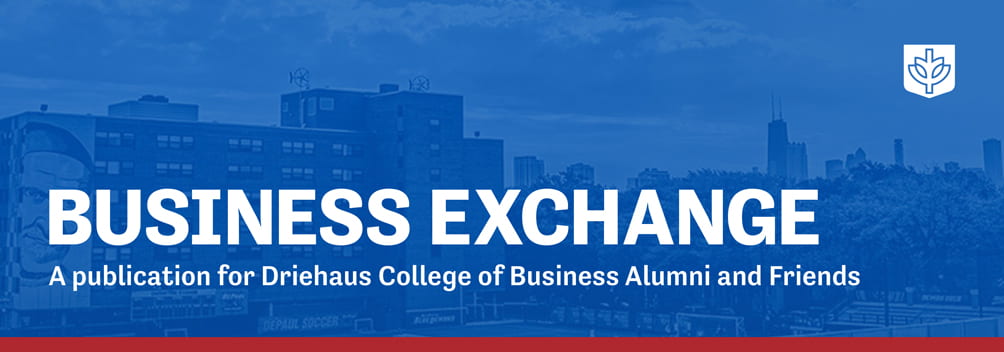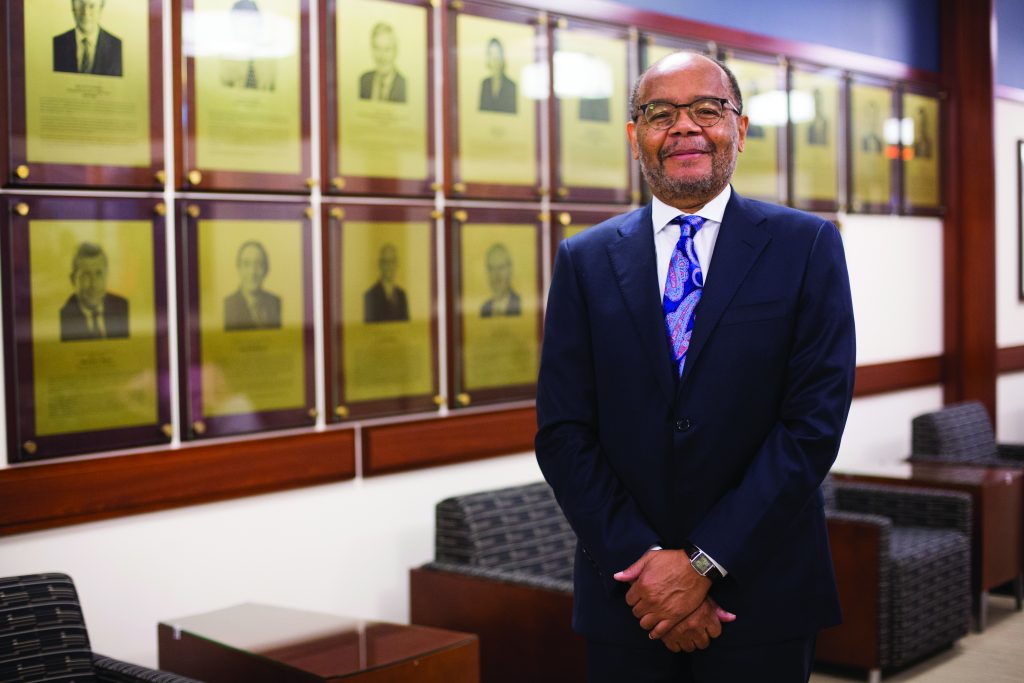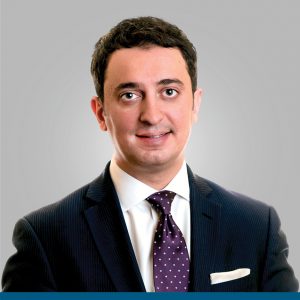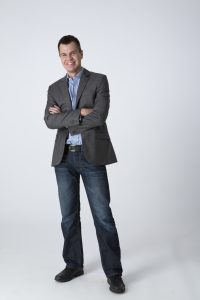By Hal Conick
In Chicago’s competitive finance industry, connections are everything. The power of connection is apparent as soon as one walks into the DePaul University Driehaus College of Business.
A row of pictures, known as the Finance Hall of Fame, are on display just outside of DePaul’s finance department. Students can look to notable faces— including Richard H. Driehaus (BUS ’65, MBA ’70, DHL ’02), founder of Driehaus Capital Management; Julie Holzrichter, who attended DePaul and is chief operating officer of the CME Group; and Frank Clark (BUS ’72, JD ’76), retired chairman and CEO of ComEd—to see how potent a DePaul education can be.
Inside the doors of the department, Finance Chair Elijah Brewer reflects on the college’s mission: Help students find rewarding careers and, one day, return as alumni to help others at DePaul.
“We’re within walking distance of all of these major financial services firms,” Brewer, a 27-year veteran of the Federal Reserve before becoming a professor, says as he regards the world beyond the windows of his Loop Campus office. “We have some financial services executives, as well as some nonfinancial executives, teaching for us. They can help us in many, many ways.”
So far, the number of connections between students, professors and the city’s financial sector has exceeded Brewer’s expectations. He emphasizes the importance of keeping the door open for alumni to work with the university; they provide significant input in shaping the department’s curriculum.
“We can draw upon people who have expertise in a variety of different areas. They help us redesign our curriculum to fit the needs of the industry,” Brewer says. “The intel they provide to us about what’s necessary for our students to be successful in their job search, as well as keeping the curriculum current— without that input it would be difficult. It wouldn’t have the same level of quality that we currently have now.”
The Weight of Research, the Future of Technology
A focus on research and industry outreach also has bolstered DePaul’s finance department, Brewer says. The department’s crown jewel and focal point for a variety of scholarly activities is the Research Institute, composed of the Center for Financial Services—which Brewer helped create—the Arditti Center for Risk Management and the Driehaus Center for Behavioral Finance.
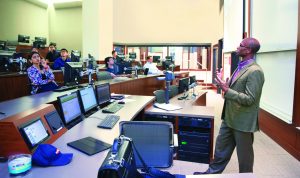
Adjunct Professor Brian Thompson (MBA ’13) with students in DePaul’s Finance Lab’s virtual trading room.
The 10-year anniversaries of the Financial Services and Arditti centers were celebrated recently with a series of events that highlighted the department’s real-world approach to education. In a case competition that challenged students to solve Illinois’ pension problems, students were coached and judged by members of the finance, actuarial and accounting industries. There was also a panel discussion on monetary policy hosted by prominent Chicago finance leaders and a dinner honoring Norman R. Bobins, a 50-year finance industry veteran who donated $50,000 for the Robert Thomas Bobins Endowed Scholarship. Meanwhile, at the Driehaus Center for Behavioral Finance, distinguished professor and scholar Hongjun Yan has joined as academic director and Driehaus Chair in Behavioral Finance, an innovative field that examines the psychology of financial decision-making (Read more about Hongjun Yan).
The finance department’s real-world emphasis is also evident in the classroom. Practical use of technology has been at the heart of the DePaul finance program’s ascent.
DePaul has kept students and alumni engaged through courses held in its Finance Lab, a virtual trading room that gives students hands-on experience with Bloomberg Terminals, financial software and real-time trading.
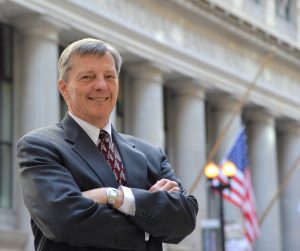
Associate Professor of Finance Carl Luft, who is also a DePaul Double Demon, says technology is changing finance education.
Associate Professor of Finance Carl Luft (BUS ’75, MBA ’77) has a unique perspective as a Double Demon who teaches multiple classes in the Finance Lab. What’s changed since Luft graduated from DePaul? The “powerful effect of technology on students,” he says. Even as the principles of finance remain static, examples that were previously drawn on chalkboards come to life via Bloomberg Terminals and visualization graphs.
“This evolution helps students more clearly understand complex concepts,” Luft says, adding that it’s necessary to expose students to this state-of-the-art technology used in the finance industry as soon as possible to keep them competitive among students from other business schools. Without constantly investigating what’s next, he says, students may get left behind.
“That’s the way of the world,” Luft says. “We’d be doing our students a disservice if we didn’t attempt to use every resource at our disposal to improve technology at DePaul.”
Success Breeds Success
Much of the finance department’s continued success has come through fostering relationships with its alumni, Brewer says. Networking among alumni is always important, but his wish for alumni to come back to help the next generation of graduates has been granted, as alumni return to lecture, mentor current students, give real-world advice about potential career paths and serve on boards.
One such alumnus is Nev Fazlioski (BUS ’11), a finance graduate who says his time at DePaul was life-changing.
Fazlioski’s family is blue collar and “right off the boat” to the United States, as he put it; they instilled a strong work ethic in him. He was the first member of his immediate family to go to college and the first to move away for school. He credits teachers at DePaul with opening his eyes to things he never imagined.
“Ultimately, any success that I’ve had at this point in my career, DePaul is 100 percent responsible for,” says Fazlioski, who works as the Chicago market director of Northern Illinois Advisor Solutions at Janus Capital Group. He also serves on DePaul’s Finance Advisory Board as its youngest member. “I’ve had some great mentors and coaches throughout the years who have, more or less, held my hand along the way to help me find out and realize certain paths I didn’t know existed.”
Troy McDonald Kane (BUS ’06), head of algorithmic client development and strategy at BGC Partners, is another alumnus who hopes to make the DePaul experience better. Kane, also a Finance Advisory Board member, started work on the Chicago Board of Trade trading floors during summer breaks from high school. Over his 22-year career, Kane says he’s prided himself on staying technologically savvy, searching for new methods of trading to increase efficiency.
“It was a perfect fit,” Kane says, of his time at DePaul. “It’s partly why I’m so involved with DePaul as an alum. I believe in the model DePaul executes with its education. I want students to see the successes that I’ve had and work with the students to be successful themselves. The more successful the future students are at DePaul, the stronger DePaul gets as an institution.”
Kane is one of the many DePaul alumni in the finance industry working with the finance department to enhance its curriculum each year. This is necessary to compete with Ivy League and East Coast schools, he says, as the internship market can be fiercely competitive. Any advantage can mean obtaining a better job right out of school.
“I think the DePaul alumni culture is really strong because we know the best way to show not just students, but also graduates that we’re here to help you be successful in your career,” Kane says, adding that he’s hired a few interns from DePaul himself. “The one thing I always instill in the student body is that your network is your strongest asset when you leave college. Those are people who could be future employers of yours, future colleagues of yours, could help you get an in at a job that you’re looking to get into. A lot of jobs are through who you know, especially top-level jobs. It’s really good to see how much the network interacts with itself both inside and outside the industry.”
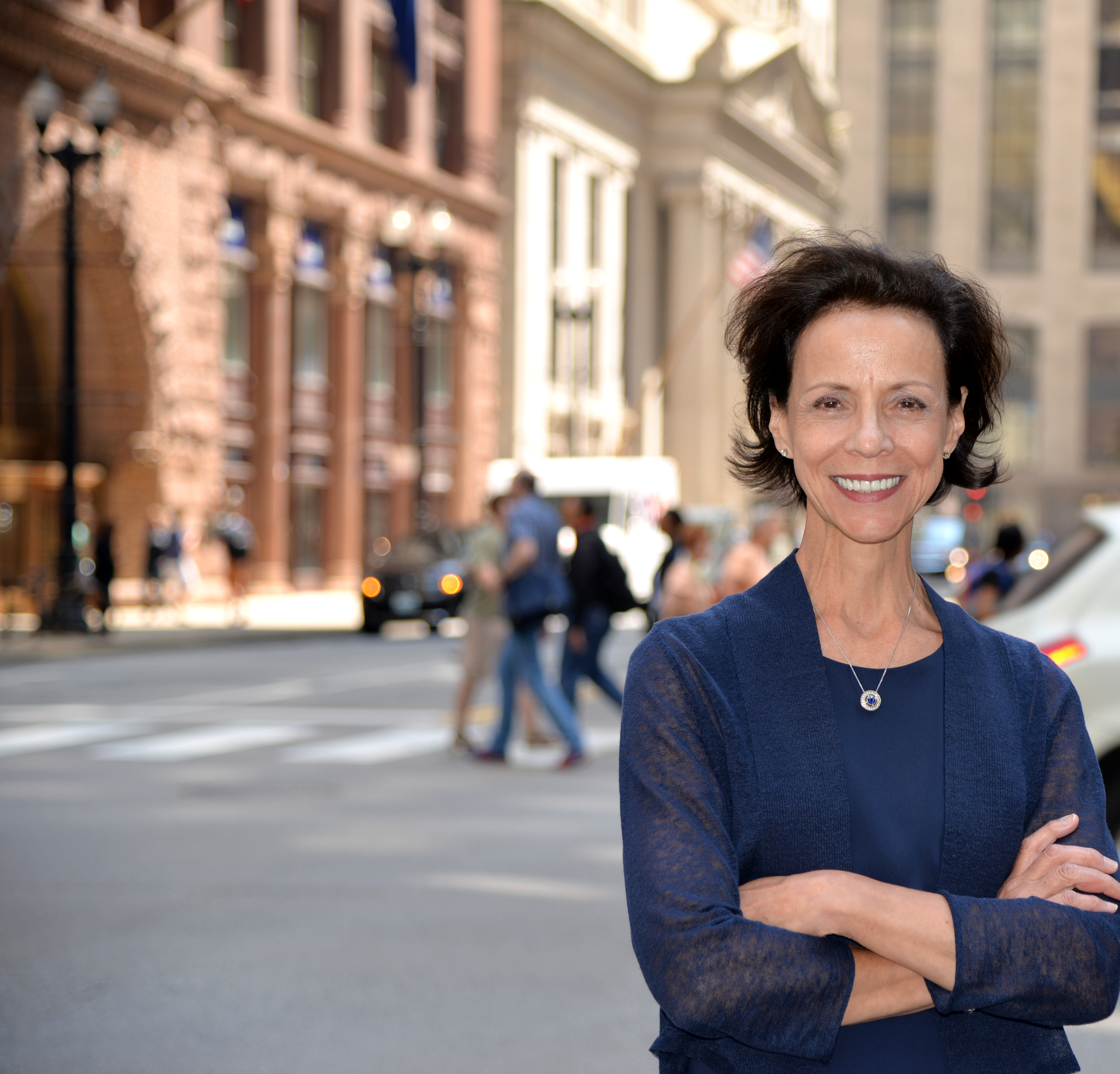
Lori Holland (BUS ’84), says the financial industry’s engagement with DePaul’s business school has been invaluable.
DePaul Finance Hall of Famer Lori Holland (BUS ’84), managing director at Neuberger Berman, has been an active alumna for 15 years; she’s a DePaul Trustee and sits on the Finance Advisory Board. Holland says she’s seen a vast improvement in alumni outreach during that time, especially involving younger alumni who may relate more easily with college-age students.
“The university has put a lot of time, effort and resources into making sure they stay connected,” she says. “And the continued engagement of the business community and, frankly, the business community stepping up to offer more internships and job opportunities has been invaluable.”
What the Future Holds
What’s next for DePaul’s finance program and its alumni?
One area Brewer wants to see grow is DePaul’s actuarial science business major, a new collaboration between the finance and math departments. With an increased focus on regulations and compliance, he says, students who choose this path are prepared to meet the modern needs of businesses.
Holland says she hopes to see young alumni continue to get involved. Kane agrees, saying reaching out and asking students to join the alumni network soon after graduation can make a world of difference.
Relatability is key, Holland says, and closing the age gap helps students better see their future career path more clearly.
“A lot of students might look at me and say, ‘That’s great, she’s nice, but she’s in a different place,’” Holland says. “Given how long I’ve been working, sometimes it’s better for them to meet people who are five years or 10 years out as opposed to 30 years out.”
The most important development, according to Fazlioski, is helping each student get a job soon after graduation. “That’s the opportunity you hope you provide for every one of the people graduating from DePaul,” he says, “to prepare them and guide them into the careers they want to go into. That’s never going to be 100 percent, but our goal is simply to make that number better.”
